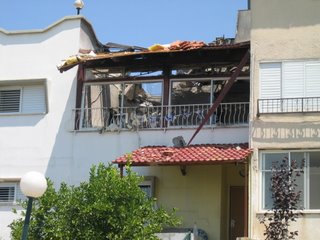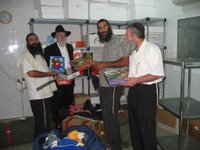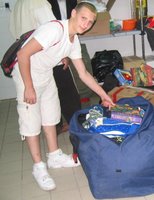A Fallen Soldier's Prayer for Peace
(Hat tip to the One Family Fund. May they be put out of business soon!)
 Benaya Rein Hy"d fell toward the end of the war on Saturday night (yahrtzeit: 19 Av). He and four others were part of a unit that went in battle to rescue wounded soldiers and soldiers in distress. 24 hours a day, often without sleep or pause, he went into battles, braving heavy fire.
Benaya Rein Hy"d fell toward the end of the war on Saturday night (yahrtzeit: 19 Av). He and four others were part of a unit that went in battle to rescue wounded soldiers and soldiers in distress. 24 hours a day, often without sleep or pause, he went into battles, braving heavy fire.
Sunday, the very day after he was killed, his sister went into labor and had a son. Shiv'ah ended, the family went to the cemetery, and from there to the beris of the new grandson, a new Benaya. An emotional roller-coaster. Finally, it was time to go through Benaya's belongings, and among the things he often took into war they found the following tefillah:

Translation:
I would love to see shuls say this Yehi Ratzon this Yom Kippur, perhaps immediately after the Yizkor said for those who fell defending Israel or as victims of terror. Or to be included with your shul's prayers for the State of Israel and its soldiers, if they say any. Please send a copy to your rav with this suggestion.
Sunday, the very day after he was killed, his sister went into labor and had a son. Shiv'ah ended, the family went to the cemetery, and from there to the beris of the new grandson, a new Benaya. An emotional roller-coaster. Finally, it was time to go through Benaya's belongings, and among the things he often took into war they found the following tefillah:
Translation:
May if be the Will before You, Hashem our G-d and the G-d of our fathers,(I put in quotes those phrases that I recognized were quotes. I also refrained from translating the idiom "chas veshalom", as I can only think of the longer "[may Hashem grant] pity and peace", which would distract from the flow of ideas more than an idiom does.)
That You erase war and bloodshed from the world,
And spread out great and awe-inspiring peace in the world ,
And "No longer will one nation life against another a sword, and they will not again learn war",
Just they will "recognize and know, all who live on the earth" "the truth for truthfulness"
That we didn't come to this world
for fighting and dispute chas veshalom,
and not for hatred and jealousy
and accusations and bloodshed chas veshalom,
we only came to this world in order to recognize
and know You, may You be blessed.
I would love to see shuls say this Yehi Ratzon this Yom Kippur, perhaps immediately after the Yizkor said for those who fell defending Israel or as victims of terror. Or to be included with your shul's prayers for the State of Israel and its soldiers, if they say any. Please send a copy to your rav with this suggestion.







